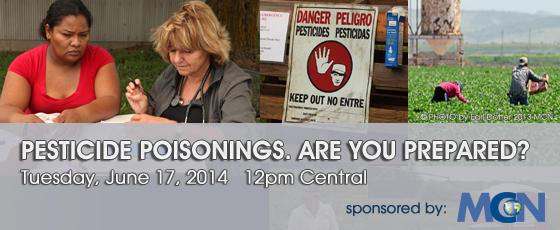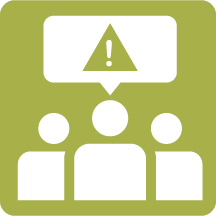The U.S. Environmental Protection Agency’s (EPA) Worker Protection Standard (WPS) provides basic workplace protections to farmworkers and pesticide handlers to minimize the adverse effects of pesticide exposure. EPA announced major revisions to the WPS in September 2015. MCN and FJ's fact sheet provides a summary of the revised regulation.
In 2015, for the first time in over 20 years, the Environmental Protection Agency updated the Worker Protection Standard (WPS). The WPS provides basic workplace protections for agricultural workers to reduce the risk of pesticide exposre. This issue brief overviews the major revisions that are particularly relevant for clinicians caring for agricultural workers.
- WPS_MCN_FJ_IssuesBrief2016.pdf (3.02 MB)
DATE RECORDED: Friday, July 11
PRESENTED BY: Ed Zuroweste, MD. Chief Medical Officer, Migrant Clinicians Network
 | |
MCN’s Environmental and Occupational Health Programs
Learn more about MCN’s training and technical assistance programs to help clinicians and health centers improve the recognition and management of pesticide exposures and other environmental/occupational health conditions.
Migrant workers are often employed in some of the most dangerous jobs in the United States. Lack of training, poor safety precautions, regulatory exclusions, lack of health insurance, language barriers, piece-rate pay, undocumented worker status, and geographical and cultural isolation can put these workers at increased risk for occupationally related injuries and illnesses and chronic sequelae.
This webinar will discuss health risks facing migrants as a result of their working conditions and highlight best practices and resources to incorporate environmental and work-related health into the primary care setting. It will aslo showcase successful initiatives employed in Community and Migrant Health Centers. Participants will become familiar with the importance of and feasible approaches to integrate environmental and occupational health into primary care from both a clinical and social justice perspective.
SPONSORED BY: Migrant Clinicians Network
OBJECTIVES: Participants will be able to:
- Understand the reasons for integratin environmental and occupational health into primary care
- Recognize the role of the clinician in work-related exposure
- Be familiar with tools and resources to address occupational injuries and exposures in primary care
CLINICAL TOOLS & RESOURCES |
|
PATIENT EDUCATION MATERIALS |
|
ARCHIVED WEBINARS & TRAINING RESOURCES |
|
DATE RECORDED: Wednesday, June 17, 2014
PRESENTED BY: Matthew Keifer, MD, MPH, Dean Emanuel Endowed Chair/Director National Farm Medicine Center
 | |
 MCN’s Environmental and Occupational Health Programs
MCN’s Environmental and Occupational Health Programs
Learn more about MCN’s training and technical assistance programs to help clinicians and health centers improve the recognition and management of pesticide exposures and other environmental/occupational health conditions.
Mistakes can be dangerous. Accurate identification of pesticides responsible for a patient's illness is important to avoid iatrogenic errors with respect to acute treatment. Join us for an important webinar that will focus on key decision points in the diagnosis of pesticide exposures and emphasize the usefulness of the newly revised resource for clinicians - The Recognition and Management of Pesticide Poisonings, 6th ed. Through interactive case studies, this webinar will illustrate effective recognition and treatment of patients over exposed to pesticides.
The webinar, sponsored by Migrant Clinicians Network, the National Farm Medicine Center and AgriSafe Network features Dr. Keifer, a board certified occupational medicine specialist and internationally renowned researcher regarding pesticides and agricultural health and safety. For over 30 years, Dr. Keifer has focused his clinical practice and research largely on farmworkers.
SPONSORED BY: AgriSafe Network, Migrant Clinicians Network, and the National Farm Medicine Center
OBJECTIVES: Participants will be able to:
- Better recognize the signs and symptoms of pesticide overexposure
- Identify key decision points in diagnosing pesticide exposures
- Demonstrate an understanding of how to use The Recognition and Management of Pesticide Poisonings, 6th ed. in a clinical setting
We encourage all participants to order The Recognition and Management of Pesticide Poisonings, 6th ed. prior to attending this webinar. Order here. PDF versions are also available at http://www2.epa.gov/pesticide-worker-safety/recognition-and-management-pesticide-poisonings
If you have experienced any trouble ordering your copy please contact: kbrennan@migrantclinician.org
CLINICAL TOOLS & RESOURCES |
|
PATIENT EDUCATION MATERIALS |
|
ARCHIVED WEBINARS & TRAINING RESOURCES |
|
LOCAL PESTICIDE RESOURCES |
The following will provide information regarding the pesticides used in your areas:
|
- http://migrantclinician.adobeconnect.com/p77irjl7cvq/
- http://www.marshfieldclinic.org/nfmc/
- http://www.agrisafe.org/
- http://1.usa.gov/1aF9rHY
- http://www2.epa.gov/pesticide-worker-safety/recognition-and-management-pesticide-poisonings
- http://1.usa.gov/1fFUSZm
- http://bit.ly/1imO43V
- http://npic.orst.edu/
- http://www.aapcc.org/
- http://extoxnet.orst.edu/
- http://www.pesticidemededucation.com/
- http://www.extension.umn.edu/agriculture/pesticide-safety/program-team/
- http://www3.extension.umn.edu/county
- http://web.extension.illinois.edu/psep/about/psepteam.cfm
- http://web.extension.illinois.edu/state/findoffice.cfm
Part 4 of 7 webinars in the CLINICIAN ORIENTATION TO MIGRATION HEALTH series.
DATE RECORDED: May 15, 2013
PRESENTERS: Amy K. Leibman, MPA, MA, Director of Environmental and Occupational Health, Migrant Clinicians Network
Dr. Mike Rowland, MD, MPH, Vice President, Medical Affairs and Medical Director, Occupational Health, Franklin Memorial Hospital
OBJECTIVES:
- Recognize the unique health risks of migrants due to their working conditions and environment
- Identify promising practices in environmental and occupational health that are feasible to implement in Migrant and Community Health Centers
- Utilize online clinical and patient education tools and resources to recognize, prevent and manage environmental and occupaional illnesses and injuries
- EOHPrimaryCareProviders_webinar.pdf (4.37 MB)
The purpose of this course is to prepare providers to diagnose and treat acute pesticide poisoning and to increase their awareness of health problems associated with chronic pesticide exposure. While the focus of the course is on workers in agricultural settings, the course contents are also applicable for treating all pesticide related illness.
Presentations by Pacific Northwest Agricultural Safety and Health Center (PNASH):
1. Age Considerations: Impacts on Pesticide Exposure and Health Outcomes
2. How to Identify the Products Your Patients are Exposed to
3. Reporting, Surveillance, Legal Aspects of Pesticide Related Illnesses
4. The Work to Home Pesticide Exposure Pathway: How to Protect Pregnant Women and Children (English and Spanish)
5. Chronic Health Effects of Pesticide Exposure
- AgeConsiderations_Pesticides_2009.ppt (438 KB)
- NameThatPesticidePresentation_0.ppt (766 KB)
- LegalAspects_2009_0.pdf (420.49 KB)
- Takehome_Pesticides_ENG_0.pdf (1.51 MB)
- Takehome_Pesticides_ESP.pdf (1.47 MB)
- ChronicHealthEffects_PesticidesPresentation_0.ppt (584 KB)
This is an MCN online course. The primary objective is to ensure clinicians serving migrant and underserved communities are aware of general childhood agricultural safety and health concerns. This will be accomplished in a way that increases the clinicians’ ability to provide effective healthcare to their patients by assessing and understanding agricultural health risks.
An MCN/CDN webcast facilitated by Candace Kugel, FNP, CNM
Matthew Keifer, MD, MPH, a board certified occupational medicine specialist and internationally renowned researcher regarding pesticides and worker health, overviews the importance of recognizing and managing pesticide exposure. To obtain free CME* credit, please complete this evaluation at the end of the webinar http://www.migrantclinician.org/national_webinar_eval. Sponsored by AgriSafe Network, Migrant Clinicians Network and the National Farm Medicine Center.
*Application for CME credit has been filed with the American Academy of Family Physicians. Determination of credit is pending.